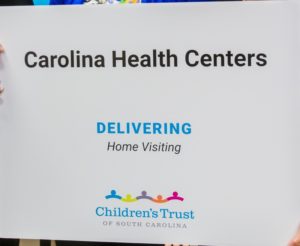Because home visiting programs are needed now more than ever, Children’s Trust continues to work with its partners across South Carolina to deliver program services to children and families during the coronavirus pandemic. While social distancing has limited much of the in-person contact usually employed by our prevention programs, our partners have skillfully adapted their work to ensure children and families receive the support and resources they need to stay strong in these trying times. Carolina Health Centers (CHC), a Greenwood-based organization that’s a patient-centered medical home for families in a five-county rural area, is a Maternal, Infant and Early Childhood Home Visiting (MIECHV) program grantee that delivers three home visiting models: Healthy Families America, Nurse-Family Partnership and Parents as Teachers. Georgia Deal, CHC director of early childhood services, answered questions about the organization’s efforts to keep its commitment to provide services mothers and their young children during the COVID-19 outbreak. Cathy Ramage, Children’s Trust home visiting senior coordinator, and Kelsay Daniels, Children’s Trust home visiting coordinator, provide support for CHC.

Tell us how your organization was able to overcome the challenges of delivering services during these difficult times.
“The home visitation programs provide several different virtual home visiting options that include FaceTime, Google Duo, telehealth and phone calls. The staff continue to provide visits during times when it is convenient for the family. Sometime the staff has to schedule visits after typical work hours to meet the family’s needs. The home visitation programs continue to utilize various methods to engage the families in the program in order to maintain program retention. We were given the necessary tools — technology via connected tablets or laptops or any items needed to be able to set up home offices. Staff has been available to deliver the necessary items to home visitors and families while observing social distancing to keep all safe. Zoom meetings to address the challenges are ongoing. Management met and set goals, met with the team to discuss goals and practicality, and checked with the IT department for support. Staff members were provided the opportunity to participate in weekly mental health webinar or get individual sessions with a licensed behavioral health counselor to ensure staff’s mental health during the pandemic.”
What moment stands out the most to you?
“We have been impressed with how the home visitors have been able to make their jobs work in a virtual world. For instance, one home visitor independently created several activity bags to distribute on the doorsteps of her families so that they could still participate in the activity without having to worry about finding their own materials. Another home visitor was able to meet a family’s immediate need of toilet paper, baby wipes and simple household items that she could not find in the grocery stores. Also, there was a participant who recently gave birth to her second child, and the home visitor was able to have a FaceTime visit with her while she was in the hospital. (We discovered) the ability to keep the families engaged and the resilience of the team.”

Georgia Deal
What did you learn that you can apply moving forward?
“We’ve learned that virtual home visits have proven to be successful for both the families and the staff. I would like to implement this tool and be able to offer virtual home visits as an option to receiving home visits. The organizations fully supported us and quickly provided guidance and resource information to our families. The families value our services as evidenced by their continued participation and engagement in visits, as well as by reaching out to their home visitor between visits when they have questions or share information on how they are coping. Many have been sending wonderful pictures of themselves and their children. There is always an avenue to connect with families, and we are always ready to adjust.”
How did the families adapt to the new way of connecting?
“The families adapted well to receiving virtual home visits, and they continue to maintain engagement in the program. Approximately 97 percent of our clients have remained enrolled in the program since we started virtual home visits. The periodic FaceTime visits and in-person visits to deliver items while maintaining social distancing have been very positive.”
Looking to the future, what do you think the impact will be on family support services?
“Some families are going to want to continue virtual home visits, while some are going to be eager to return to receiving their normal face-to-face home visits. We think the service delivery will be different due to the new health and safety standards that will need to be followed while providing services in the home. The home visitation programs will continue to provide for the needs of the families and support them either in person or virtually. This (situation) has forced us to be creative in delivering services, and it has increased flexibility in some areas meeting client’s needs and schedules that might not have fit within our previous ways of providing services. Not being able to do in-home, in-person visits has limited our ability to fully assess how families are managing. Completing some assessments has proven to be very difficult in a virtual setting. I hope this experience will widen our options and flexibility.”
Learn more about Children’s Trust home visiting program
Learn more about Carolina Health Centers
Learn more about the national scope of home visiting



